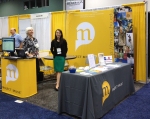By Tashina Gunning, marketing coordinator, Project MUSE
I returned last week from spending several days in Anaheim, California, at the American Library Association’s annual meeting. Project MUSE, as we always do at ALA, had a booth in the exhibit hall where we met current and prospective library customers, and talked with them about the many exciting changes that 2012 has brought to us at MUSE. One of those changes that we were especially excited to share with ALA attendees this year was the launch of our new logo. It was fun to see the surprised reactions on many of our long-term subscriber’s faces as they walked by our booth and saw the bright, bold logo for the first time.
changes that we were especially excited to share with ALA attendees this year was the launch of our new logo. It was fun to see the surprised reactions on many of our long-term subscriber’s faces as they walked by our booth and saw the bright, bold logo for the first time.
The theme of this year’s ALA was Transforming Our Libraries, Ourselves. The subject of “transformation” was woven throughout the conference programming and in the conversations of its attendees, presenters, and exhibitors alike. With the introduction of our new logo and brand identity, the addition of books on our platform, and a newly designed interface, transformation is a concept that is very fresh in the minds of those of us at MUSE.
I attended a session entitled Transforming Collections in which a public, college, and university librarian each discussed the unique ways that their institutions are “transforming” their collections in the face of harsh budget cuts, rapidly evolving technology, the changing needs and expectations of users, and the redefinition of what even constitutes a library collection. As I listened to the presenters share clever ideas in collection management and building, it was apparent to me that many in the library world are choosing to confront today’s challenges with innovation and initiative.
The presenters demonstrated that with a strong sense of creativity and a hearty dose of gumption, these challenges are actually opportunities for improvement, expansion, and collaboration.

Like the field of librarianship, publishing faces radical changes and countless difficulties today, many of which are directly tied to those being experienced by libraries, and most every other facet of academia. The current landscape can undoubtedly be nerve wracking for those of us in the world of scholarly publishing. As we navigate an increasingly unfamiliar environment encountering new challenges each day, we find ourselves in the midst of our own transformation. Hopefully, that transformation as both individual institutions, and an academic community of publishers, libraries, and scholars, will be one of greater opportunity, than obstacle.
